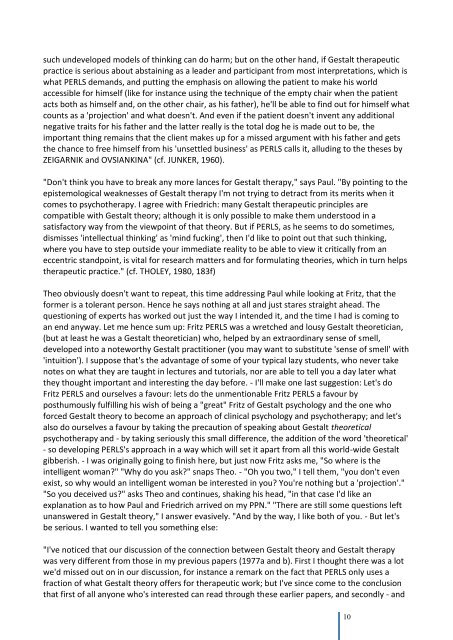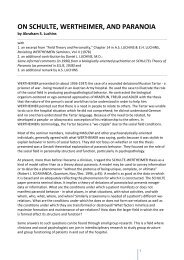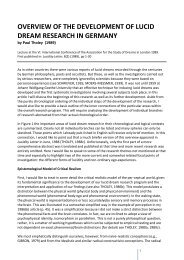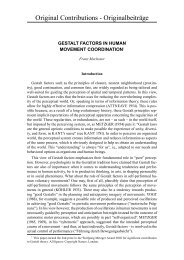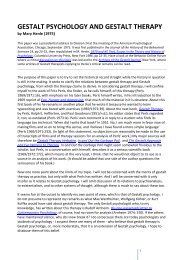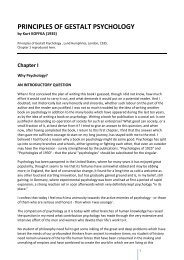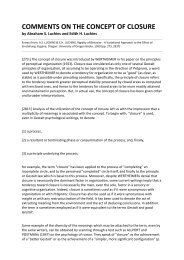pdf-Download - Society for Gestalt Theory and its Applications (GTA)
pdf-Download - Society for Gestalt Theory and its Applications (GTA)
pdf-Download - Society for Gestalt Theory and its Applications (GTA)
Create successful ePaper yourself
Turn your PDF publications into a flip-book with our unique Google optimized e-Paper software.
such undeveloped models of thinking can do harm; but on the other h<strong>and</strong>, if <strong>Gestalt</strong> therapeutic<br />
practice is serious about abstaining as a leader <strong>and</strong> participant from most interpretations, which is<br />
what PERLS dem<strong>and</strong>s, <strong>and</strong> putting the emphasis on allowing the patient to make his world<br />
accessible <strong>for</strong> himself (like <strong>for</strong> instance using the technique of the empty chair when the patient<br />
acts both as himself <strong>and</strong>, on the other chair, as his father), he'll be able to find out <strong>for</strong> himself what<br />
counts as a 'projection' <strong>and</strong> what doesn't. And even if the patient doesn't invent any additional<br />
negative tra<strong>its</strong> <strong>for</strong> his father <strong>and</strong> the latter really is the total dog he is made out to be, the<br />
important thing remains that the client makes up <strong>for</strong> a missed argument with his father <strong>and</strong> gets<br />
the chance to free himself from his 'unsettled business' as PERLS calls it, alluding to the theses by<br />
ZEIGARNIK <strong>and</strong> OVSIANKINA" (cf. JUNKER, 1960).<br />
"Don't think you have to break any more lances <strong>for</strong> <strong>Gestalt</strong> therapy," says Paul. "By pointing to the<br />
epistemological weaknesses of <strong>Gestalt</strong> therapy I'm not trying to detract from <strong>its</strong> mer<strong>its</strong> when it<br />
comes to psychotherapy. I agree with Friedrich: many <strong>Gestalt</strong> therapeutic principles are<br />
compatible with <strong>Gestalt</strong> theory; although it is only possible to make them understood in a<br />
satisfactory way from the viewpoint of that theory. But if PERLS, as he seems to do sometimes,<br />
dismisses 'intellectual thinking' as 'mind fucking', then I'd like to point out that such thinking,<br />
where you have to step outside your immediate reality to be able to view it critically from an<br />
eccentric st<strong>and</strong>point, is vital <strong>for</strong> research matters <strong>and</strong> <strong>for</strong> <strong>for</strong>mulating theories, which in turn helps<br />
therapeutic practice." (cf. THOLEY, 1980, 183f)<br />
Theo obviously doesn't want to repeat, this time addressing Paul while looking at Fritz, that the<br />
<strong>for</strong>mer is a tolerant person. Hence he says nothing at all <strong>and</strong> just stares straight ahead. The<br />
questioning of experts has worked out just the way I intended it, <strong>and</strong> the time I had is coming to<br />
an end anyway. Let me hence sum up: Fritz PERLS was a wretched <strong>and</strong> lousy <strong>Gestalt</strong> theoretician,<br />
(but at least he was a <strong>Gestalt</strong> theoretician) who, helped by an extraordinary sense of smell,<br />
developed into a noteworthy <strong>Gestalt</strong> practitioner (you may want to substitute 'sense of smell' with<br />
'intuition'). I suppose that's the advantage of some of your typical lazy students, who never take<br />
notes on what they are taught in lectures <strong>and</strong> tutorials, nor are able to tell you a day later what<br />
they thought important <strong>and</strong> interesting the day be<strong>for</strong>e. - I'll make one last suggestion: Let's do<br />
Fritz PERLS <strong>and</strong> ourselves a favour: lets do the unmentionable Fritz PERLS a favour by<br />
posthumously fulfilling his wish of being a "great" Fritz of <strong>Gestalt</strong> psychology <strong>and</strong> the one who<br />
<strong>for</strong>ced <strong>Gestalt</strong> theory to become an approach of clinical psychology <strong>and</strong> psychotherapy; <strong>and</strong> let's<br />
also do ourselves a favour by taking the precaution of speaking about <strong>Gestalt</strong> theoretical<br />
psychotherapy <strong>and</strong> - by taking seriously this small difference, the addition of the word 'theoretical'<br />
- so developing PERLS's approach in a way which will set it apart from all this world-wide <strong>Gestalt</strong><br />
gibberish. - I was originally going to finish here, but just now Fritz asks me, "So where is the<br />
intelligent woman?" "Why do you ask?" snaps Theo. - "Oh you two," I tell them, "you don't even<br />
exist, so why would an intelligent woman be interested in you? You're nothing but a 'projection'."<br />
"So you deceived us?" asks Theo <strong>and</strong> continues, shaking his head, "in that case I'd like an<br />
explanation as to how Paul <strong>and</strong> Friedrich arrived on my PPN." "There are still some questions left<br />
unanswered in <strong>Gestalt</strong> theory," I answer evasively. "And by the way, I like both of you. - But let's<br />
be serious. I wanted to tell you something else:<br />
"I've noticed that our discussion of the connection between <strong>Gestalt</strong> theory <strong>and</strong> <strong>Gestalt</strong> therapy<br />
was very different from those in my previous papers (1977a <strong>and</strong> b). First I thought there was a lot<br />
we'd missed out on in our discussion, <strong>for</strong> instance a remark on the fact that PERLS only uses a<br />
fraction of what <strong>Gestalt</strong> theory offers <strong>for</strong> therapeutic work; but I've since come to the conclusion<br />
that first of all anyone who's interested can read through these earlier papers, <strong>and</strong> secondly - <strong>and</strong><br />
10


